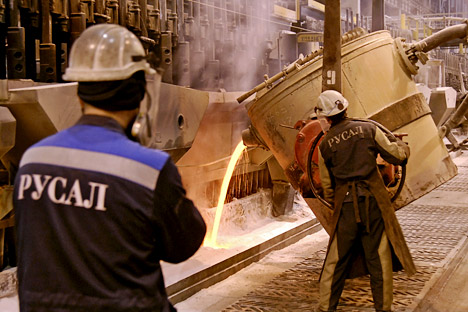Rusal to halt aluminum production at four of its factories

The Rusal Corporation has 16 aluminum factories in Russia; four will soon be closed. Source: ITAR-TASS.
The company’s Board of Directors approved a program for the shut-down of aluminum production at four of its unprofitable enterprises. The long-suffering Bogoslovsky Aluminum Plant (BAP), which even Vladimir Putin failed to save, is on the list.
On Aug. 24, Rusal’s Board of Directors approved a program allowing for the closure of aluminum production at four of its enterprises. A source close to the the situation says that the list of closures includes unprofitable enterprises located in western Russia. He specified that the Bogoslovsky Aluminum Plant located in Krasnoturyinsk, Sverdlovsk Region, is the largest of these.
Rusal will not comment on this information, but states that Rusal will unveil neither the results of the Board’s meeting nor its agenda until they are officially released on the Hong Kong exchange.
Another source of RBC Daily close to the Board of Directors said, “The Board decided to cut ineffective capacities gradually, due to high energy prices causing losses and the expiry of long-term agreements for electricity supply.”
Earlier, Rusal stated repeatedly that high electricity prices led to unprofitability in some of its company’s enterprises, including BAP. In December 2011, then Prime Minister Vladimir Putin attempted to solve the enterprise’s problem, when he announced at a government meeting that the IES Holding belonging to Viktor Vekselberg would sell the Bogoslovsky Thermal Power Plant to Rusal, in order to balance the situation at BAP. The aluminum company, in turn, promised to modernize the enterprise. Both parties, however, failed to agree on a price and the transaction never took place.
Later, Rusal submitted a plan to Sverdlovsk’s regional government for the modernization of BAP’s aluminum production, but the plan’s crucial clause was related to price of electricity: no more than $0.03 per 1 kWh, while in 2011 the plant bought electricity for $0.068 per 1 kWh. Consequently, Rusal failed to come to an agreement with energy suppliers on this critical pricing issue. According to the RBC Daily’s source, aluminum production at BAP is to be completely halted by the end of 2012.
There is no information regarding which other enterprises, besides BAP, will be shut down. According to Oleg Petropavlovsky, an expert for BCS Financial Group and Brokers, the most likely candidates are the Volkhovsky Aluminum Plant in Leningrad Region, the Kandalaksha Aluminum Plant in Murmansk Region and the Nadvoitsy Aluminum Plant in Karelia. The Volgograd Aluminum Plant and the Ural Aluminum Plant are other ‘candidates’ for closure, but they enjoy some competitive advantages over the aforementioned enterprises. Still, Petropavlosky says that their turn may soon also come. He reiterates the fact that Oleg Deripaska announced the cut of Rusal’s capabilities by up to 10% through the end of the year, while the four enterprises likely to be closed cover about 8% of the company's output.
A source of RBC Daily close to the company’s Board of Directors assures that the decision on cut capacity will not affect social situations in the regions where Rusal is present. Still, a protest to save BAP is scheduled in Krasnoturyinsk for early September. Up to 4,000 participants plan to call for the return of the plant to its former owner, Viktor Vekselberg.
Petropavlovsky thinks that these enterprises will, most likely, not be closed completely but diversified to produce alloys instead. The financial analyst adds that, while this process will lead to partial staff reduction, it will at least help avoid a complete shutdown. According to the expert's estimates, Rusal will have to dismiss about 30% of these enterprises' employees. Patropavlovsky believes that a reduction of unprofitable capacities at current metal prices is, in general, positive news for Rusal: cutting its capacities by 8% will allow the company to retain its world leading positions in aluminum production, while increasing its profitability. Rusal is not the first global company to take such measures: giants such as Alcoa and Rio Tinto have also launched programs to reduce their production capacities.
Original publication can be read in Russian at RBC Daily website.
All rights reserved by Rossiyskaya Gazeta.
Subscribe
to our newsletter!
Get the week's best stories straight to your inbox